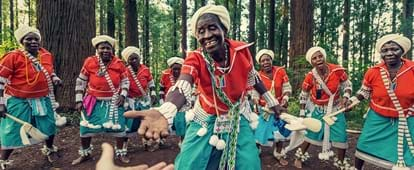By creating an account, I agree to the
Terms of service and Privacy policy
Choose your country and language:
Africa
Americas
Asia Pacific
Europe
VVenda culture and traditions are rooted in the responsibilities of the royal leaders, who are referred to as mahosi or vhamusanda in the Luvenda language, which means chiefs or traditional leaders who are royal leaders. The royals and their children embody good morals, and lead their communities by example. There’s a Venda proverb that says that if they lack values, they then have a bad odour - “mukololo a kola u a nukha”.
The rules of behaviour and traditions are upheld by the royals and the community. Venda culture is also guided by traditional initiation schools where children learn more about their culture, and how to conduct themselves at home and in their community.
WWomen are taught chores such as sweeping, fetching wood and vegetables, washing and cooking. They also learn how to bath and keep their homes clean. They learn through playing games and song and dance. Girls and women also learn how to do handiwork such as making mats, baskets and pottery.
Men are responsible for looking after livestock, and so boys are taught about cattle. They also learn about the trees which they can fetch as poles for building huts, grain pits and fences, and they’re initiated in birds and animals in order to hunt.
Dance holds an important place in Venda culture, and from an early age, children learn dance, drumming and making musical instruments. There are different Venda traditional dances, some for men, others only for men, and several for men and women together. These dances are malende, tshikona and matangwa. There’s also a dance called tshigombela, performed by women, which carries messages of what is happening in the communities. When all these songs are sung, people show happiness by clapping, singing and beating drums. Even when the song carries an unhappy message, the others reply by singing to change the mood.


AAbout the author
Makondelele Netshilungwi was born Luheni Dzimauli in Mathale Village and raised in the chief’s palace with the Venda royal family. Netshilungwi is an expert on indigenous matters, having learnt everything from the elders. He is currently serving as an advisor to the Chief of Tshidzivhe territory. He is also the chairperson of Dzomo la Mup, an organisation that works to protect sacred sites, reviving indigenous knowledge to assess and respond to the environmental challenges, and enabling members of Venda clans to have a strong unified voice that represents all communities.
Related articles

